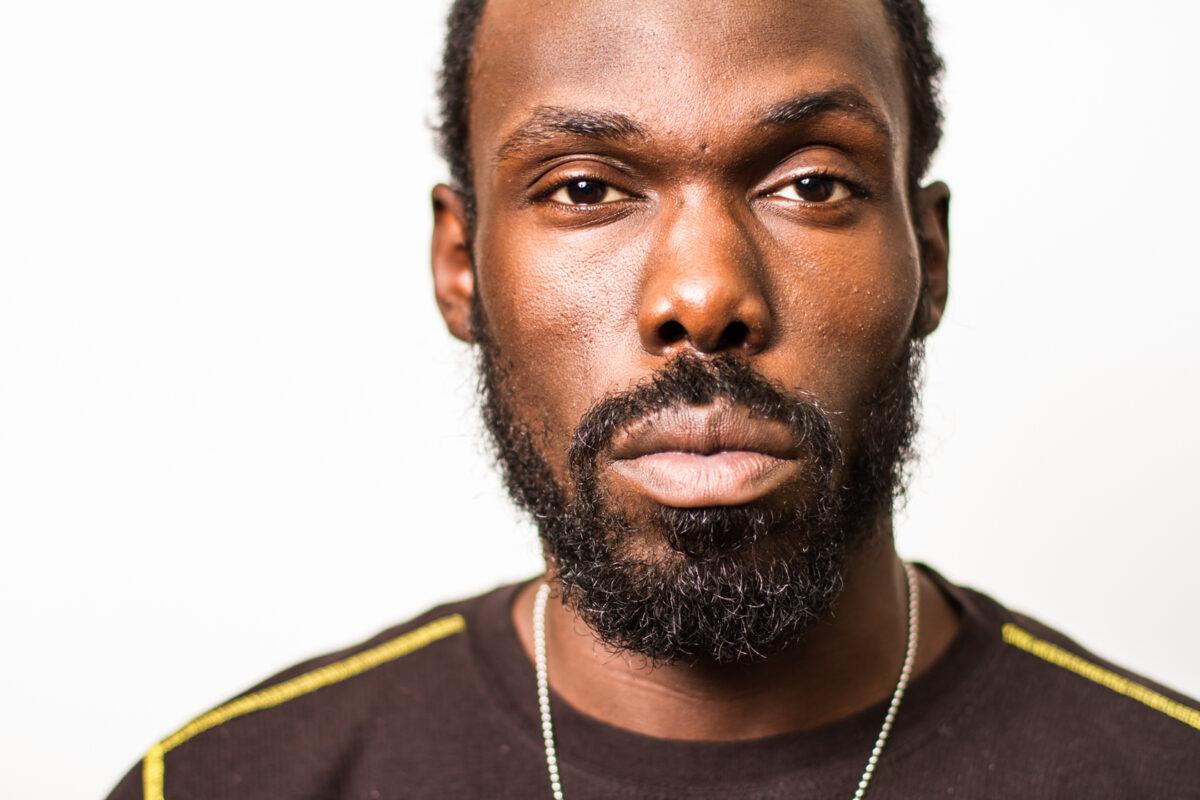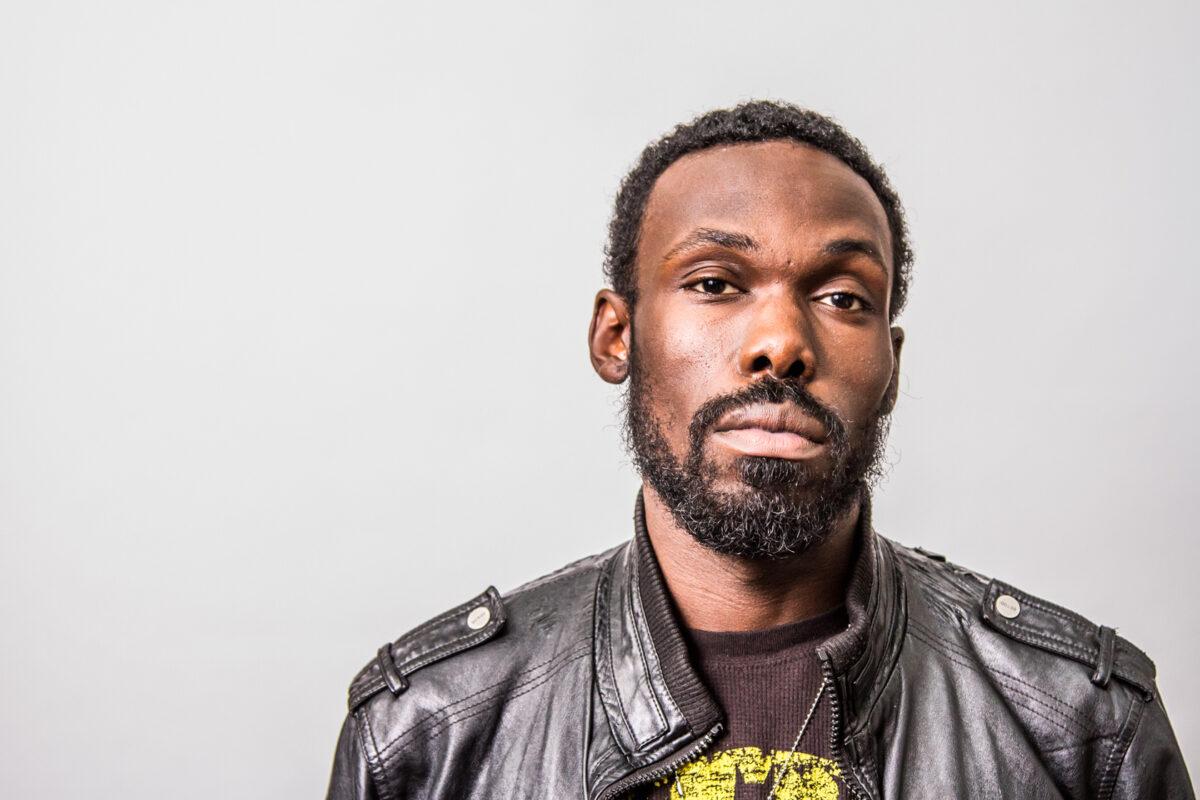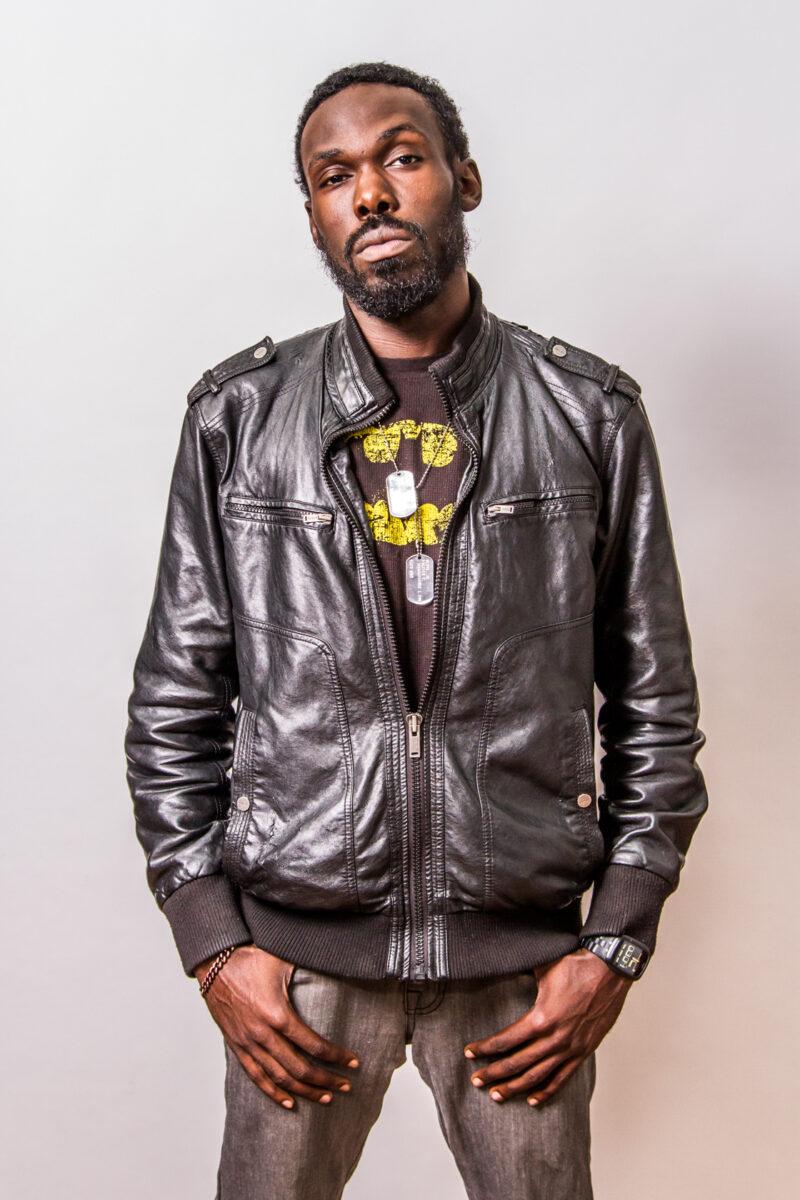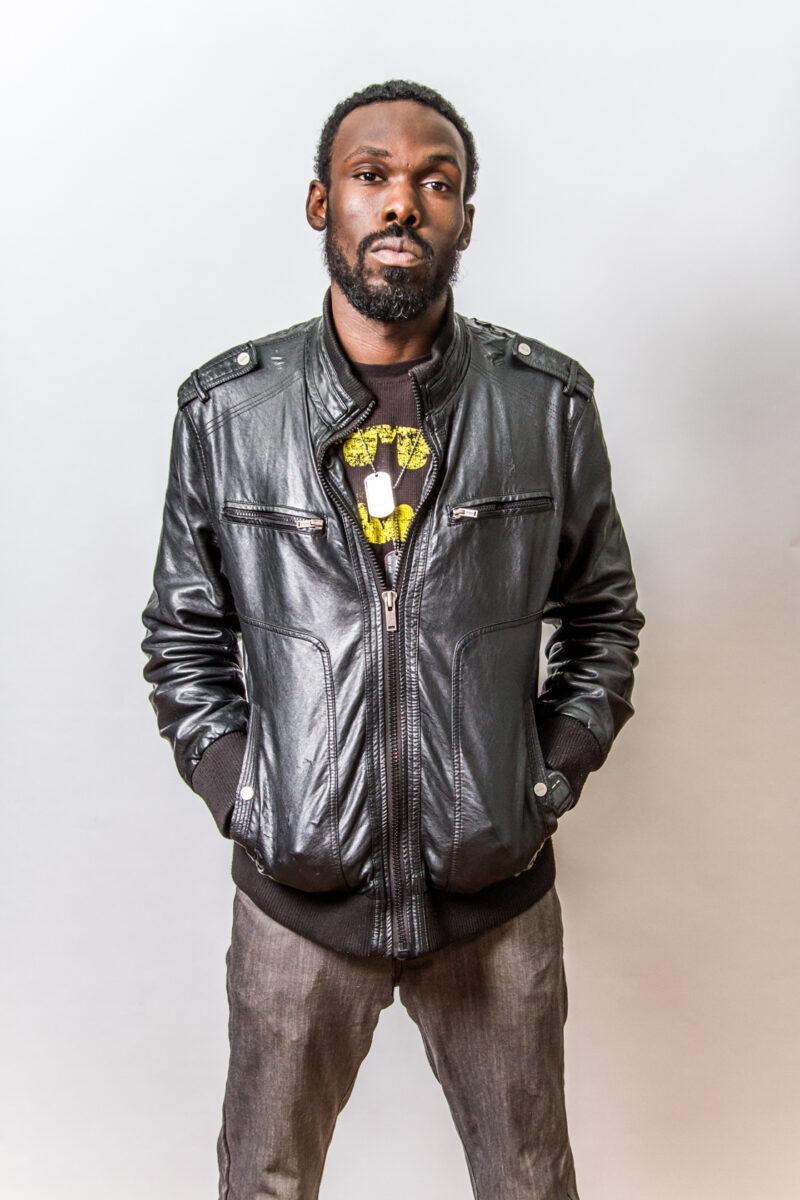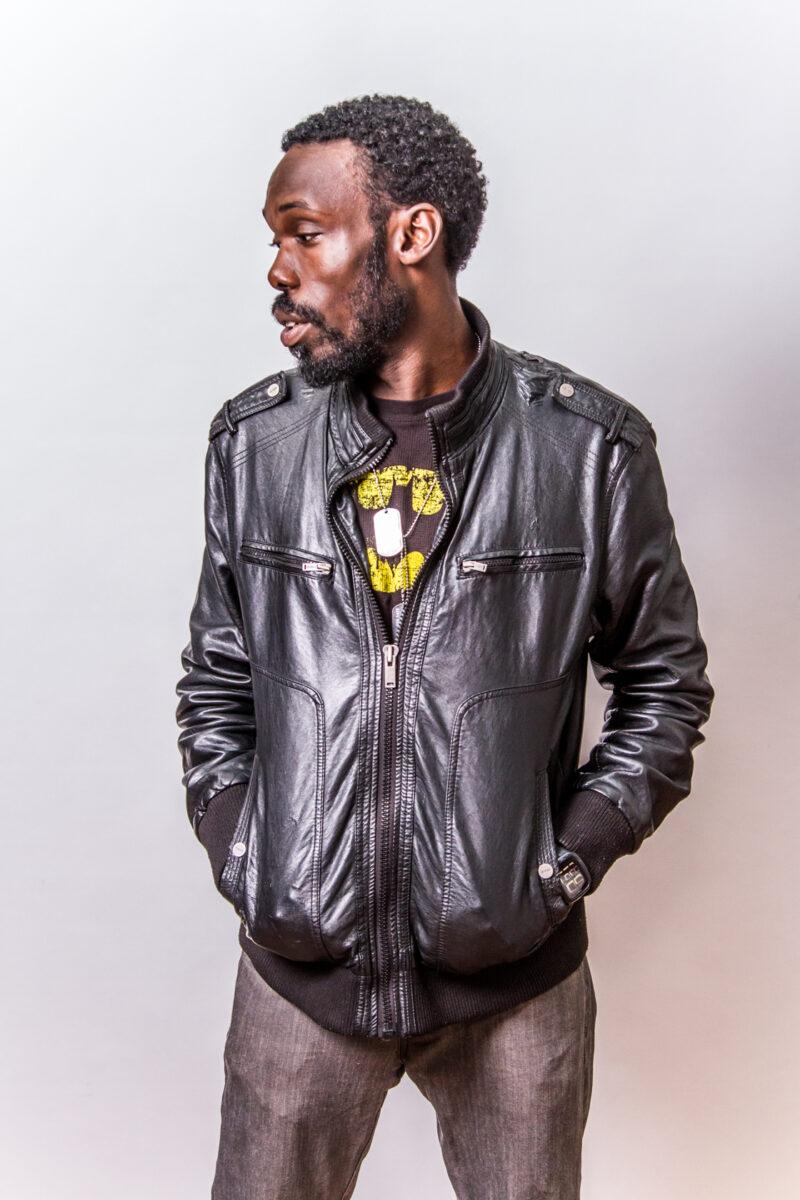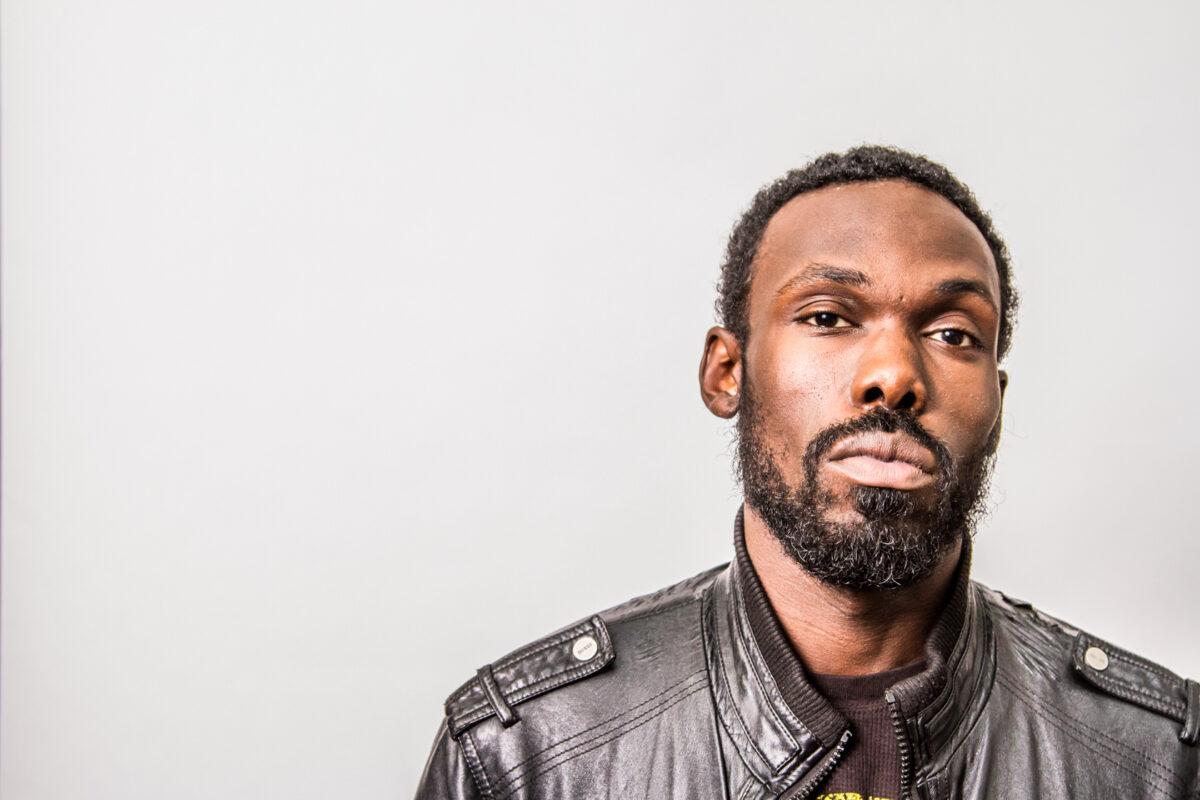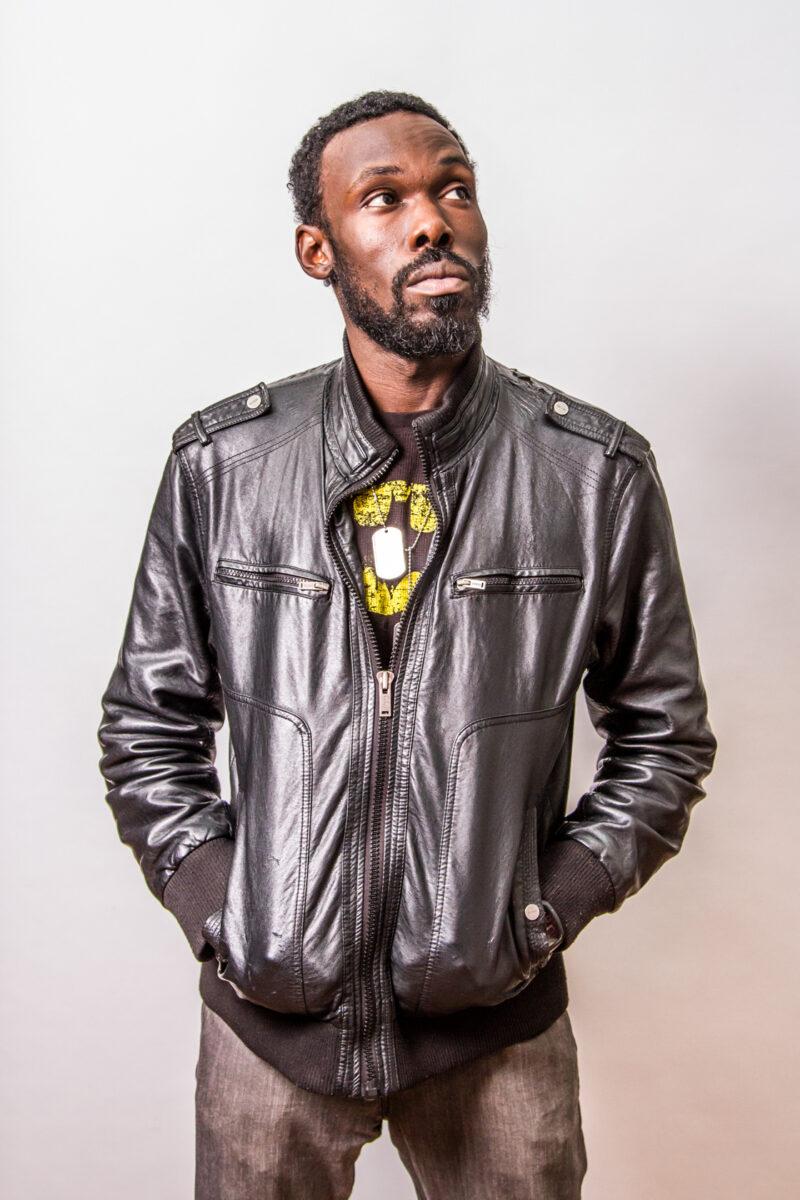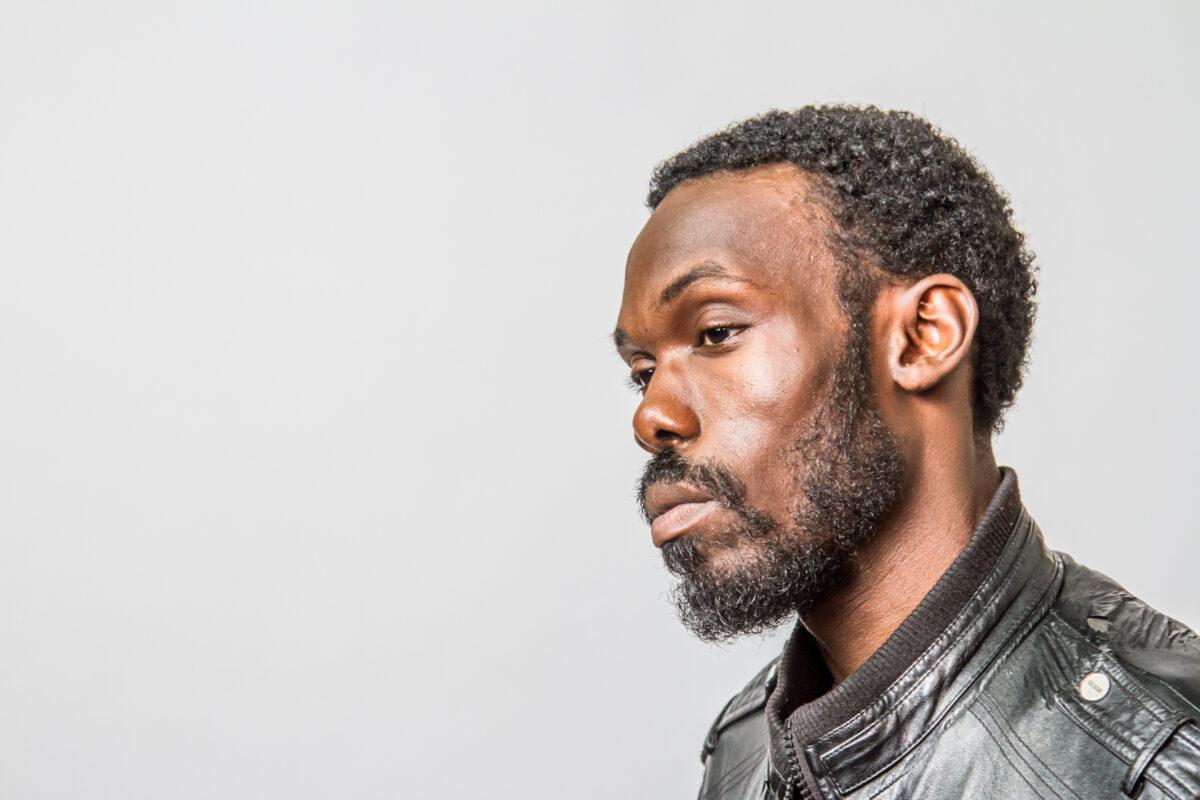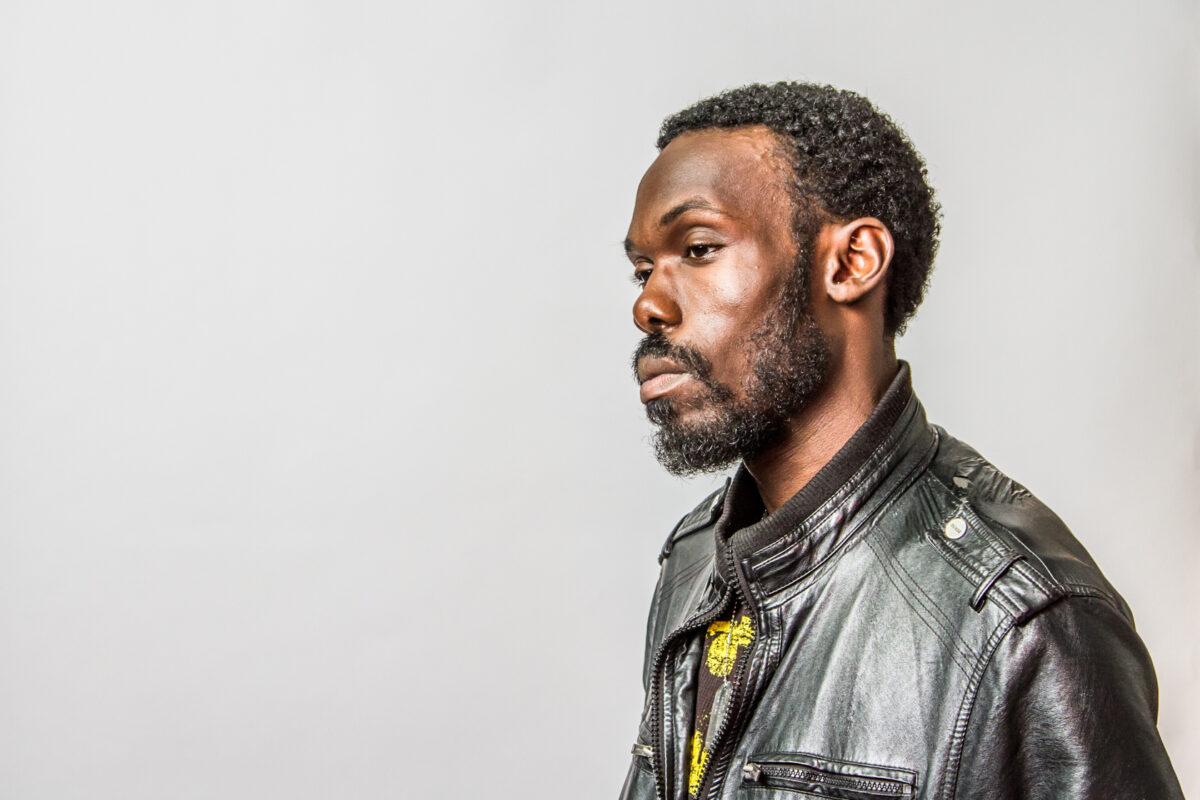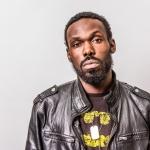The High Key Portrait Series: Stan Davis
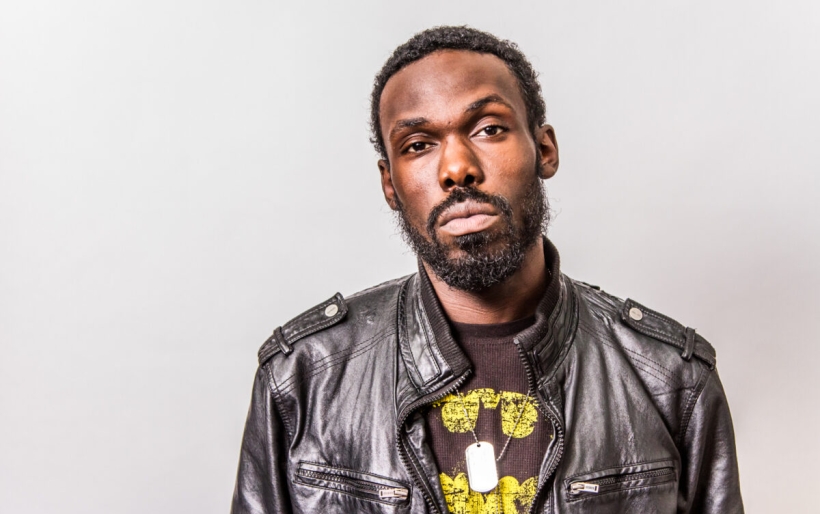
Stan Davis | photo by Josh Pelta-Heller for WXPN
“High Key” is a series of profiles conceived with the intent to tell the story of Philly’s diverse musical legacy by spotlighting individual artists in portrait photography, as well as with an interview focusing on the artist’s experience living, creating, and performing in this city. “High Key” will be featured in biweekly installments, as the series seeks to spotlight artists both individually and within the context of his or her respective group or artistic collective.
For almost 20 years now, musician Stan Davis has toured with artists at every level of stardom, from local to international, and put down bass tracks on almost every stage across Philly. He’s proficient with several other instruments as well, and the versatility has afforded him the opportunity to play with diverse musicians in genres from jazz to hip hop to gospel.
Having established himself on both his musical talents and sweat equity, Davis has earned the right to be able to advise — which, from his perspective, is most important. In this interview, Davis reflectively returns several times stress to the importance of work ethic for young musicians looking to build a name for themselves in the music industry. At the same time, he looks back, through memories and stories — from his time studying music at Central High to being prepped for a show by Lauryn Hill — on the colorful career in the musical arts that he’s grateful to have.
This year, Davis is active as ever — he’s done shows with national R&B artists Syleena Johnson, Vivian Green, and Tia McNeil, and worked on Tia’s debut album, due out soon. He’s also in the process of completing his own album, and expects to have some news to share about it soon.

Stan Davis | photo by Josh Pelta-Heller for WXPN
THE KEY: You’re Philly born and raised, right?
STAN DAVIS: Born and raised, North Philly, 25th and Master.
TK: Where’d you go to high school?
SD: Central.
TK: Tell me a little bit about Central, what do you remember from high school?
SD: Man, my experience at Central was great. I’ll put it to you like this: I didn’t initially want to go to Central. My parents wanted me to go to Central.
TK: Where did you wanna go?
SD: I didn’t really know. I was a kid, and I was coming into the arts and into music for myself, and I wanted to learn more about that. I knew that I wanted to be a musician, one way or another. I didn’t know what I wanted to do with my life — like job-wise, responsibility-wise — but I knew that I wanted to get into music. So obviously I considered CAPA, I considered just different schools with different musical backgrounds.
TK: Central has a huge music program.
SD: Yeah, but Central has an orchestra, I didn’t wanna play in the orchestra! [laughs] I figured a school with an orchestra is gonna be corny, it’s gonna be a bunch of classical cats who are just reciting jazz transcriptions. I was like, I don’t wanna play with them!
TK: But you ended up working with Steve Wilensky?
SD: Yeah, I worked with Mr. Wilensky. And he and I had a love-hate relationship, you know. Like I said, I was young. And cocky. [laughs] I learned a lot from him. I learned a LOT. I attribute the majority of what I know about music theory to that man.
TK: He’s an incredible instructor.
SD: Yeah. And, when I was in my youth, I knew a lot about music. I know what a Gm7 [chord] was. I didn’t know why it was called a Gm7, but he helped me understand that. He basically taught me how to read. I knew spaces and faces, but he taught me how to read. You know what I’m saying. So yeah, my experience with Central was tremendous. I met a lot of musician friends who I’m still cool with today.

Stan Davis | photo by Josh Pelta-Heller for WXPN
TK: Did you play bass with their jazz band?
SD: No, I was just learning bass when I was at Central. Matter of fact, I picked bass up for the first time when I was in 9th grade. I started playing guitar a year later because of being at Central. I was starting to get into audio production, like making tracks. I would be in the computer tech lab all the time — programming on whatever program we were using — and I would call my friends that I knew play guitar to come play on my records. I was doing R&B and jazz records, and they’re all punk rockers — they’re listening to Nirvana and Blink 182 — so I would get frustrated with them because they didn’t understand what I was trying to get. And I would take the guitar from them and figure out the part that I wanted them to play, and I would give it back to them to play it. And after I did that like about four of five times, I was like, you know what, I got some time, I’m sitting here anyway, I might as well learn this daggone instrument.
TK: What did you play at Central then?
SD: Piano. Primarily.
TK: Did you play in the band?
SD: I did. My freshman year, there were like a few music scenes. That was ‘97 — ’98, so that was the peak of the Black Lily movement, so neo-soul was huge at the time. So they had like R&B ciphers after school and stuff like that in the music room, and I would be in there, you know, just a young bull like, fly-on-the-wall freshman like WHOA! Listening to the musicians and stuff going in. And that opened up a whole new realm of musical experience for me.
TK: So what got you into the Philly music scene, initially, was it high school or after that?
SD: Really, after that. You know, when I was in high school, like I said, the Black Lily movement was huge..
TK: …did you get to The Five Spot?
SD: I had been to The Five Spot a couple times. I was underage, I snuck in, you know how that is. A whole bunch of kids was down there. That was my first time ever hearing Floetry, sneaking in The Five Spot, in the backdoor, and meeting Jaguar Wright. You know, just meeting a hearing all the greats that I heard about — people I heard on the radio, and heard other people talking about — to see them live, in front of your face, especially at that age, was tremendous for me. So I wanted to learn more about my instrument, my craft. I wanted to understand what was different between what these guys were doing, and what it is that I’m doing. You know what I’m saying? That was really what it was about for me. So high school had a lot to do with that, because high school introduced me to music — you know, learning records, learning the instrument — and Black Lily pretty much exposed me to a different form of artistry, different things to do with the music. That was huge for me, to take all that in, all at the same time.
TK: Who’s your favorite Philly artist, or which artist influenced you most?
SD: You know what, I would have to say it would be Fatin [Dantzler] and Aja [Graydon], Kindred The Family Soul. My first professional music experience — like touring with a band — was with them. I was 19, going on 20 years old. Pretty much everything that I know and knew about professional touring, band leading, music directing, I learned the hard way, with them, one way or another. Or through a connect that I made through them. Fatin’s been like a big brother to me, pretty much since day one. He’s literally been a friend to me through a lotta different transitions and situations in my life, not just in my musical career. He also put me on, when they kinda slowed down with their touring, for various reasons, he was instrumental in putting me in touch with Lauryn Hill’s band, and I ended up going on the road with her. And like I said most of the professional contacts that I have now, I made through touring with them, one way or another. You know, so I owe a lot to them.

Stan Davis | photo by Josh Pelta-Heller for WXPN
TK: What was it like being on tour with Lauryn Hill?
SD: You know what, it was very very interesting man. She’s a rare breed. She’s got a very unique perspective and concept on her artistry. She’s also very up front. I feel like you can’t help but respect a person who tells you what it is from the beginning. Working with Lauryn taught me a lot. It taught me a lot about how to interact with artists. You know, artists in general have a very unique perspectives on pretty much everything: on life, on money, on time, on all of these different concepts that we deal with as adults all the time. Certain artists, when they reach a certain level of success, it’s kinda like you have to do what you gotta do to keep pushing the envelope, in different ways. If it’s a matter of just staying relevant, if it’s a matter of working, if it’s a matter of trying to elevate, trying to do new things, and just trying to make those transformations in general.
So I feel like as musicians, it’s our job to support them. We’re going through it as well, but the thing about it is that, artists pretty much have to look at their artistry the same way as musicians do, you know. As a self-employed musician, my value and my income is directly reflected by my hustle. And if I don’t hustle, I’m not gonna eat. You know what I mean? If I don’t do the gig, do the gig appropriately, give the people what they want, show up on time, you know — if they say “hey, can you guys turn down,” don’t argue with them! Little stuff like that. If I don’t understand these basic things, then I’m not gonna be successful in this business. Artists have a whole different set of rules that they have to follow. A lotta times they feel like, you know “well, I’m Lauryn Hill, I don’t have to…” — I’m saying, for example, obviously. “Who are you to tell me, I’m Stan Davis?!” Sure, I have the right to be that way! But are they gonna call me back, is the question. If I don’t care if they call me back, then that’s one thing, you know. My dad always said, “it’s not about getting the call, it’s about getting the call back.” That’s like a first date: you’re not gonna get a second date if you screw up. [laughs] You know? It’s that simple.
And I feel like, a lotta times we have tendency to dehumanize artists. You know, we don’t know what they go through. Even with Lauryn, you know, she has her own concept of time. For various reasons. I feel like, having been backstage, and having seen her process… I remember one time I was in her hotel room, and she’d bought suits for all the guys, and she bought outfits for the girls, and she wanted everyone to come in and more or less — not “model” — but she wanted to see what everybody looks like in their suit, and make whatever adjustments. Some people had bowties, little stuff like that. Now mind you, at that point, I think it was about 8:30 [p.m.], when I went in there for her to check me out. We’re supposed to be on the stage already. We’re at the hotel. The girls come from the other room, and they all had these outfits on — one girl had a zebra-print jumper on, one girl had leopard, it was animal prints, these different hairstyles, and she said, “I don’t like it. Do it over. Change ‘em.” And you know how long it takes to do hair and makeup, clothes for three background singers? Now, needless to say, we didn’t get to the stage ‘til almost 11 [p.m.]. Now I’m not saying that that happens all the time, or that happens every time, but different things happen often. And on one hand, you look at it from the consumers’ standpoint: these people paid their money, they want what they want when they want it. On the artist’s standpoint, I feel like she just wants to put her best foot forward. You know, she has a vision, she wants to execute it. And it’s that simple. But of course, you got that balance, to deal with. You know what I mean? And a lot of artists deal with it differently, a lot of artists balance differently.
Musicians, too. You know, musicians, I feel like have the worst tendencies… musicians are the worst at adulting. Just, in general, that just kinda seems to be the way that it is. And I realize that a lotta people have looked up to me in a lotta different ways, so I try to I guess just spread a good message, make some sense out of all of this, especially to younger generations coming into this: take it seriously. I think that it’s relative. How seriously you take it is gonna determine how far you go. You know what I mean? That’s what I think.
TK: What do you remember from your first time performing in Philly?
SD: Let’s see… the first major show that I did in Philly.. You know what, matter of fact, now that I think about it, it was the Great Gospel Gathering. That was my first time playing bass for a major concert, especially with notable gospel artists, and a big choir, big band and all that, and we did it at the Mann Music Center, out in West Philly. That was surreal. How old was I… I had to be 18, 19, something like that. Now mind you, I just started playing bass when I was 15, in high school, so, to be in that type of position that soon was surreal. And I remember conversations that I had with my uncles, my dad — my dad was a musician, so I grew up in a musical household. My dad toured with a bunch of different artists. My youngest memories was me and my mom, and my dad was on the road, sending money, and stuff.
TK: Who did he tour with?
SD: He played with Billy Hall, the Blue Notes, Rachelle Ferrell, Phyllis Hyman. He did a bunch of theater, different theater productions, he did a lot plays and stuff, usually music director, piano player. My dad played the piano, so that was his role in those situations. My uncle Stacy McGee, he’s another accomplished musician, in the city. They toured with like Boyz II Men, and Aaliyah, and a bunch of R&B acts, that sorta thing. And you know, coming up as a teenager, just starting to get into music, I remember being all hype, every time I would see him — “Uncle Stacy Uncle Stacy!” asking him all the questions, “what’s it like going to Istanbul, with Boyz II Men?! What’s it like being on an airplane?!”
TK: To clarify, Stacy’s your father’s brother?
SD: Stacy’s not my blood uncle, but he actually lived two blocks away from me as I was growing up. One of his best friends is my dad’s brother Johnny, and the two of them toured together with a bunch of artists. Being in that position pretty much reminded me of all the conversations I had with them, being on that stage just reminded me of them and I know they were super proud of me, you know? That’s all I was thinking about. The music is the easy part. I feel like, that’s pretty much what we do. I got up on stage and played what I would’ve been playing at church. I played what I would’ve been playing in rehearsal.
TK: You’re saying playing the music’s the easy part, what’s the hard part?
SD: The gig. Being on time. Learning the music. Not arguing. Wearing a uniform. If they say wear all-black, wear all-black, you know? Not black with a pink t-shirt. You know what I’m saying.

Stan Davis | photo by Josh Pelta-Heller for WXPN
TK: What’s your favorite venue to play in Philly, and what about it do you like?
SD: Good question. Let’s see, there’s a lot. There’s TLA, it’s cool, it’s kinda big, it depends on the show you’re doing. If you’re doing a hip hop show or something like that, high energy, that’s the place you wanna do it. Pristine sound. Standing room, dope acoustics, all of that. There’s smaller spots, matter of fact, there’s a cool spot uptown called Reuben’s Marc, that I’ve done a couple of things in with a couple different artists. Tiny little… looks like hole-in-the-wall bar type of place…
TK: Uptown where, North Philly?
SD: Northwest, Mt. Airy. They have a whole stage and more or less venue upstairs. It’s dope. It’s a lot tighter, it holds probably 60-75 people max. But like for indie artists, jazz, it’s dope for that. Then there’s World Cafe Live and stuff. Oh, Underground Arts! Underground Arts is a dope venue, it’s got a kind of like a TLA-type of feel, but it’s not quite as massive, so you get a little more of the intimacy. I like that energy, especially when you’re overseas touring and stuff, there’ll be like 300-400 people packed in a room this big [gestures small size], but the energy is so hot. So I dig that. We actually hosted a jam session for awhile, about two years. It’s a great venue. I think if I had to choose, I would pick that place, because of number one the history, and number two because of my relationship with [manager] Mike [Thatcher], Mike’s a good friend of mine.
TK: What do you like most about being in the arts scene in Philly?
SD: The sense of camaraderie. There’s a lot of support among the Philly music scene. There’s a lot of artists, there’s a lot of musicians, there’s a lot of talent. There’s a lot of studios, there’s a lot of places to play. There’s a lot of venues, jazz venues, there’s a diverse variety of music here in the city, and yet it’s all kind of interconnected. Everyone knows everyone. People stop me all the time, “hey you play bass, right?” They may know my name, they may not. But that’s what I’m talking about, the sense of camaraderie, the sense of family. We all know each other, and you know, I’m the young boy to all of them — Stacy [McGee], Pablo [Batista] — they were the guys that were doing it when I was dreaming about it. They were the guys who I was asking questions when I was trying to figure out how to do it, you know, and now I’m doing it with them. You know what I mean, it’s all full-circle. That’s what I love most.
TK: What do you find frustrating, if anything, about it?
SD: You know what, for me I think the biggest hurdle would be the fact that musicians are terrible at business. A buddy of mine said it best: a lot of musicians, especially the younger musicians, you could tell have never had a job before. Understanding a sense of responsibility, a sense of obligation to… even just to your word. If you say you’re gonna do something, do it. When you understand that sense of responsibility, “you know what, I may not feel like it today, but I still got bills to pay,so I’m not gonna just quit and just give up on everybody. I’m gonna take it seriously, I’m gonna be on time, I’m gonna do what I said I was gonna do regardless of how I feel.” You know, as musicians, because the job description itself is so subjective and so emotionally charged, it’s all based on inspiration, so if you’re not feeling it, it’s that much harder to do. That’s what makes it so difficult to be consistent in this business, and so the people that are able to do that are successful, you know? I think that would probably be the biggest challenge.
TK: Which neighborhoods have you lived in, in Philly, which do you love?
SD: Well, I was born in North Philly, I more or less grew up in the Mt. Airy section. I’ve lived in Germantown, I’ve lived in West Philly for a bunch of years now. You know what, I love Philly, man. You know, all those areas have their own identity, their own kinda culture. And to say my “favorite,” I’m kinda partial to West Philly. I know it well, I know where everything is.
TK: Any particular neighborhood?
SD: I’ll say Overbrook. That’s where I live now. My son’s school is right up the street, right off the expressway. I know where the food is. It’s familiar, yet it still has its own culture, you know what I mean. Like I say, each of these different areas has its own identity. West Philly’s nothing like North Philly, North Philly’s nothing like South Philly. And being uptown — I always call it “uptown,” the Mt. Airy section — being up there’s different, the vibe is different, the people are different, the pace is different, even the food is different, in that area of town. But it’s dope, it’s family-oriented, everything is accessible. Couple venues up there as well.
TK: How do you like to get around town?
SD: [laughs] You know, I like to walk. Believe it or not, I do like to walk. Most of the time I have to drive, but I like to walk because I like to pace myself, I like to get fresh air, take in the sights and sounds around me. A lotta times that’s the only alone time I get.
TK: Being a dad, or what?
SD: Yeah. Being a full-time musician and a father is two full-time jobs.
TK: How have you seen the city change, growing up here, and has it been for the better or the worse?
SD: Man, there’s a lotta changes, now that I think about it, and I think that it can be taken both ways. I think that the gentrification factor has played both ways because, number one, it introduced a lot of different culture and renovations to areas that otherwise wouldn’t see it. But then that poses the question of why haven’t these areas seen any renovations until gentrification begins? But then on the flipside, like I said, there’s a lot of culture and a lot of things that are brought along with it.
You know, in all honesty, everything that I knew about white people before I went to Central, I learned from watching Full House, [laughs] you know what I mean? That’s the thing, if you don’t get these hands-on experiences, these opportunities to talk to other individuals, you’ll never understand how much we actually have in common. So that’s the thing for me. At least now, my children have the opportunity to experience some different culture. So I embrace that, I look forward to that. The city in general is going through a lotta changes. I think change is necessary. It’s not comfortable. It’s almost never comfortable. Most of the time the most uncomfortable changes are the most necessary, but I think that it’s just important to acknowledge it. I think that that’s the downside to those changes, is the lack of acknowledgement that happens across the board.
- Stan Davis | photo by Josh Pelta-Heller for WXPN
- Stan Davis | photo by Josh Pelta-Heller for WXPN
- Stan Davis | photo by Josh Pelta-Heller for WXPN
- Stan Davis | photo by Josh Pelta-Heller for WXPN
- Stan Davis | photo by Josh Pelta-Heller for WXPN
- Stan Davis | photo by Josh Pelta-Heller for WXPN
- Stan Davis | photo by Josh Pelta-Heller for WXPN
- Stan Davis | photo by Josh Pelta-Heller for WXPN
- Stan Davis | photo by Josh Pelta-Heller for WXPN
- Stan Davis | photo by Josh Pelta-Heller for WXPN
